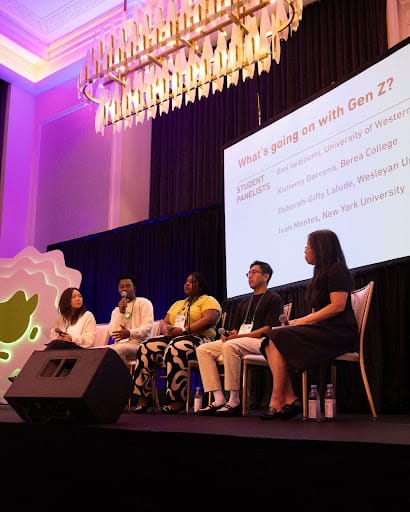Over the next six years, a wave of Gen Z students will be enrolling at universities around the world. For global educators, the big question is how best to engage this new crop of learners. To this end, our new report, Voices from the Field: Debunking the Gen Z Myth, shares findings from interviews with seven geographically and culturally diverse Gen Z students currently attending universities in the U.S., the UK, and Australia.
The report explores everything from social media, to AI usage, to Gen Z’s outlook on the future. We dove even further into these topics at this year’s DETcon in Pittsburgh—home to Duolingo HQ—where a panel of experts offered 3 pieces of advice to help university leaders prepare for, and engage with, the next generation of learners.

1: Embrace authentic storytelling
Among the 100 educators and administrators who attended DETcon, “authenticity” was the buzzword when discussing effective ways to reach Gen Z. But what does being authentic look like in higher education recruitment, admission, and learning?
Panelist Jamal Jordan, Washington Post editor on the Next Generations team, leads the newspaper’s efforts around experimentation and new formats. Jordan highlighted the strength of Gen Z’s “BS filter”: their ability to determine when someone isn't being honest and consistent.
With this in mind, Jordan said it’s important for universities to let students tell their own stories, free from administrative oversight and approval. This advice echoes another trend revealed in the report: Gen Z trusts their peers above authority figures. The era of polished, university-orchestrated and edited content shared by carefully-selected student ambassadors is a thing of the past. Instead, universities should give enrolled students the autonomy to create their own content and give prospective applicants an unfiltered, authentic view of a day-in-the-life at your university.
Panelist Michaela Kron-Hags, Duolingo’s Marketing Campaign Director, agreed that allowing Gen Z staff the freedom to direct marketing efforts has helped Duolingo connect with younger learners. Michaela explained how her team entrusted Zaria Parvez, a Gen Zer, to build Duo’s ”unhinged” brand on social media platforms, with playful, authentic, and sometimes chaotic messaging that resonates with Gen Z’s sense of humor.
By empowering Gen Z team members to take the lead, Duolingo has ensured that our messaging was both relevant and impactful, demonstrating the effectiveness of peer-driven content in building genuine connections.
2: Conduct social listening
Being in the enviable position of having successfully engaged the Gen Z audience, Michaela shared her advice for how brands—including universities—can communicate more authentically. According to Michaela, “it starts with truly understanding your audience, being in the weeds, and conducting ‘social listening” —that is, analyzing online conversations about the industry at large, to find out more about the audience.
For example, her team closely monitors the very active Duolingo subreddit as a source for honest, and at times critical, feedback about the content they put out. The Duolingo social team adapts their strategy based on what they learn.
Krong-Hags noted that part of Duolingo's viral success lies in identifying specific "fandoms" or niche communities, such as anime enthusiasts who are interested in learning Japanese.
To effectively reach prospective students, universities can adapt Duolingo's marketing strategies by recognizing and catering to the diverse interests within Gen Z. By understanding these affinities, universities can create targeted content and partnerships that resonate with these groups. "Speaking the language" of your audience makes outreach efforts more engaging and effective.

3: Align with Gen Z values
Though much of the panel’s conversation around Gen Z was based on anecdotal evidence, it is backed by research. Panelist Dr. Corey Seemiller is a professor of Organizational Leadership at Wright State University and author of Generation Z Goes to College. Seemiller’s work with Gen Z started in 2013 when her university noticed the incoming students were “different,” and she has since dedicated her research to understanding what makes this generation unique.
She also encourages universities to think about what their institutions can offer this generation, which is value-driven and purpose-oriented. To effectively engage them in the recruitment process, it’s important to connect with their values and interests and to show how your mission and offerings align with their individual desire to make a positive impact on the world.
“[Gen Z students] want to feel special, they want to feel wanted,” Seemiller says. “They want to know they aren’t just a part of a mass recruitment effort to come to your institution. It is crucial to communicate something specific that aligns with their interests, beyond just offering their major.”
By learning what makes Gen Z tick, universities can level-up their recruitment game and truly connect with this savvy, purpose-driven generation.
